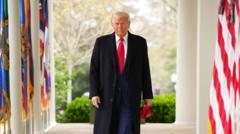With Donald Trump's impending tariffs set to take effect, countries are hustling to adjust their trade agreements. While allies like Israel and Japan seek to mitigate the implications of Trump's actions, China remains defiant, provoking fears of a broader economic fallout.
Uncertainty Reigns as Global Economies Brace for Trump's Tariff Decisions

Uncertainty Reigns as Global Economies Brace for Trump's Tariff Decisions
As the deadline for new tariffs approaches, nations scramble to negotiate with the US, while Trump remains firm on his stance, leaving the world teetering on the edge of economic chaos.
As the clock ticks down to Donald Trump's newly announced "reciprocal" tariffs, the global economy stands on a precarious edge. With the deadline looming, many nations labeled as "worst offenders" are making diplomatic overtures to the White House in a bid to diffuse potential chaos. In stark contrast, China is escalating its resistance, setting the stage for a high-stakes standoff.
Despite this intense backdrop, Trump remains steadfast. Indicators from both Congress and Wall Street are increasingly suggesting that the president's motives may be more than mere negotiation tactics—they could be part of a larger vision aimed at restructuring the global economic landscape. For Trump, the measure of a nation’s status—inclusive of its allies—is now defined by its willingness to offer favorable trade agreements.
Israeli Prime Minister Benjamin Netanyahu, the first foreign leader to engage Trump post-tariff announcement, proposed eliminating barriers and rebalancing trade with the US, positioning Israel as a model for others. Similarly, Japanese leaders are reaching out, hoping to align with Trump’s vision amid his evolving policy on global trade—a consideration echoed by European Union leaders offering to eliminate tariffs on industrial goods as a counter-offer.
The tension escalated when China reciprocated with its own tariffs against the proposed US increases, prompting Trump to threaten even higher tariffs if China does not relent. As trade war rhetoric intensifies, Chinese representatives assert their commitment to defending their interests against US aggression.
Concerns ripple through the stock market as volatility rises, revived by the ambiguous communication from Trump’s administration. While some believe a delay in tariffs could be on the table—as investors rallied momentarily upon erroneous reports—Trump quickly quashed those hopes, reaffirming his hardline approach.
Adding to the economic uncertainty, Trump's top trade adviser issued a stark warning to global leaders: the negotiations were over, and what was being offered as compromise was merely the opening act of a broader strategy.
As speculation grows regarding Trump's ultimate goals—ranging from fostering a weaker dollar to benefiting American exports—economists caution against the inherent risks of such an aggressive stance. The mixed messages and varying narratives from the administration only serve to deepen the uncertainty that hangs over the global economy as it navigates these tumultuous waters. With promises of change and disorder ahead, the world watches with bated breath, uncertain of the path that will unfold.






















